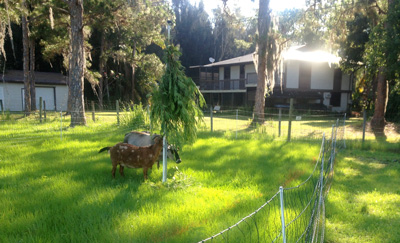ECHOcommunity Updates
New Leaders in Indonesian Small-Scale Farm Development 2015-04-28
YAS Project managers Hermansyah and Anthony, along with Mr. and Mrs. Kusnadi, attended the 2011 ECHO Asia Agriculture and Community Development Conference in Thailand. Their purpose was to network with other individuals and organizations like theirs, and to learn about techniques that could be implemented in their area. During the conference they were particularly impacted by a trip to Maejo University vermicomposting facility, which focuses on using worms to break down organic food waste in order to produce high-quality compost and worm juice. Inspired by what they saw during the field trip, the team went back to Medan and began experimenting with various vermicomposting systems.
Bike-powered Appropriate Technology featured in Smithsonian Magazine 2015-04-20
The coffee team from IDDS Tanzania was highlighted in Smithsonian Magazine this month with a story about how a self-taught Tanzanian inventor, nonprofit workers, and MIT students collaborated on a potentially life-changing tool for coffee growers.
Research Update: From The ECHO Global Farm 2015-04-06
Two new field experiments are being established this month at ECHO’s Global Demonstration Farm in southwest Florida. Both studies involve tropical legumes, which provide farmers with a source of green manure, grain, and/or animal fodder.
Community Member Highlight - Jean Apedoh 2015-03-31
ECHOcommunity member Jean Apedoh is a trained agronomist from Togo who has become a recognized authority in West Africa on a technique used to increase rice yields called SRI. Jean first came across the System of Rice Intensification (SRI) at the 2010 ECHO West Africa Forum through a presentation given by Erika Styger of Cornell University.
SRI is a system for planting and maintaining rice crops that has proven, under certain conditions, to increase yield while reducing plant density and water application.
Compost Heap Impact on Habari Maalum 2015-03-24
The Habari Maalum Tree Nursery, outside of Arusha, Tanzania, provides over 200,000 tree seedlings per year to the surrounding villages. Until recently, HM has relied upon forest soil collected from the Olmotonyi Forest on the lower slopes of Mt Meruto replenish their nursery.
Increasingly, there is opposition and expense to travel the 10km up into the forest to obtain this soil. While the nursery has permission to harvest this soil, the Forest Department frowns upon this activity, and it interferes with other farmers who are interplanting their farm crops under the early canopy of the plantation forest, a method called "Taungya."
Resources from the Wheaton College 2015 HNGR Symposium 2015-03-16
The 2015 Symposium sponsored by the John Deere Foundation explored the complex linkages between conflict and hunger and underscored the fundamental importance of reconciliation work for regaining food security in post-conflict settings.
As the Symposium Plenary Speaker, Dr. Emmanuel Katongole addressed the role of reconciliation in the multiple dimensions of post-conflict recovery, with a focus on regional examples from East Africa that directly address agricultural initiatives as integral to the process of rebuilding peaceful communities that support healthy agrarian societies.
ECHO Asia Notes Issue 23 2015-03-10
Many of the forages that farmers currently provide to their livestock are of low quality but are perceived as being readily available and low in cost. However, the opportunity costs of spending time seeking forages is often not considered; the time spent herding and tethering animals to find feed is also time away from other educational or income generating activities. I propose an alternative method: to integrate tropical forages into the smallholder farming system, in order to improve farmers’ livelihoods.
Kacheri Woman Reaps Benefits From TOGETHER Program Poultry Vaccinations 2015-03-02
Robert Okumu-Obonya, ECHO Technical Advisor for the TOGETHER Program, an initiative of ECHO, Church World Service, and MAP International, with funding support from St. Mary’s United Methodist Church Foundation, reports on progress being made through a poultry vaccination program being implemented in the Kacheri sub-county of northern Uganda. The initiative, which facilitates the vaccination of rural chickens against Newcastle disease, is one of several TOGETHER Program efforts being implemented to improve the short- and long-term livelihoods of community members in Kerheri and neighboring sub-counties.
Viral Newcastle disease is evidenced by gasping, contorted birds with greenish/watery droppings which results in an almost 100 percent mortality rate among poultry where the disease is not under control. Such outbreaks are a major setback for the typical rural household for which chickens contribute a huge economic and nutritional resource.
East Africa Newcastle Disease Vaccination Chickens Together Project
On The ECHO Global Farm: Grazing Management Systems 2015-02-23
Potential for Reducing Smoke and Improving Soil Fertility in Northern Thailand 2015-02-16
Every February-March, rice fields are burned throughout Thailand. These very low temperature burns produce huge amounts of smoke that causes serious public health problems, as well as greenhouse gases, smog precursors, dioxin and furans. This practice also destroys valuable organic matter contained in the straw and kills the micro-fauna in the soil. In comparison, the field prototype that Warm Heart is developing utilizes the rice straw as a resource by pyrolyzing it. Charring the organic matter at high temperature in the absence of oxygen reduces the noxious gases released and is virtually smokeless.








